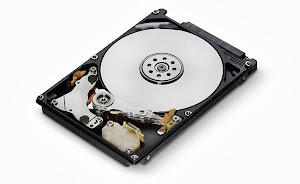- Get link
- X
- Other Apps
It has happened to most of us. We buy a new hard drive (or maybe a flash drive) with mind boggling storage capacity only to find that it has less space than what was mentioned on the box. Angered, we start cursing the manufacturer and our dealer for false marketing thinking that they should be sued for doing this. Hey, but have you ever wondered how they continue to do this again and again without getting into legal trouble?
The answer is that they are not marketing it falsely at all. Surprised? I'll explain.

A manufacturer considers 1 Megabyte to be 1000 Kilobytes, 1 Gigabyte to be 1000 Megabytes, 1 Terabyte to be 1000 Gigabytes and so on. This is correct considering that kilo means 1000 and mega means 1000000 (10^6). However, computers calculate on base 2 and to them, 1 MB is actually 1024 kilobytes, 1GB is 1024MB and 1 TB is 1024GB. This difference in the method of computation is responsible for this "missing space."
Lets take an example of a 500 GB hard disk.
From a manufacturer's point of view, the 500GB will have 500*1000*1000*1000 = 500000000000 bytes.
From a computer's point of view, 500GB is actually 500*1024*1024*1024 = 536870912000 bytes.
So, a hard drive that promises to have 500 GB storage space will actually display 465.66GB, 536870912000-500000000000 = 36870912000 bytes (34.34GB) less storage space when connected to a computer.
Take a look at the table given above to see how much space is "lost" due to computers working on a base 2 system. As you can see, with the increase in capacity of the storage device, there is an increase in the missing space.
The answer is that they are not marketing it falsely at all. Surprised? I'll explain.

A manufacturer considers 1 Megabyte to be 1000 Kilobytes, 1 Gigabyte to be 1000 Megabytes, 1 Terabyte to be 1000 Gigabytes and so on. This is correct considering that kilo means 1000 and mega means 1000000 (10^6). However, computers calculate on base 2 and to them, 1 MB is actually 1024 kilobytes, 1GB is 1024MB and 1 TB is 1024GB. This difference in the method of computation is responsible for this "missing space."
Lets take an example of a 500 GB hard disk.
From a manufacturer's point of view, the 500GB will have 500*1000*1000*1000 = 500000000000 bytes.
From a computer's point of view, 500GB is actually 500*1024*1024*1024 = 536870912000 bytes.
So, a hard drive that promises to have 500 GB storage space will actually display 465.66GB, 536870912000-500000000000 = 36870912000 bytes (34.34GB) less storage space when connected to a computer.
| Space Promised | Displayed on a computer | Difference |
| 100GB | 93.13GB | 6.87GB |
| 250GB | 232.83GB | 17.17GB |
| 500GB | 465.66GB | 34.34GB |
| 1TB | 931.32GB | 92.68GB |
| 2TB | 1862.64GB | 185.36GB |
Take a look at the table given above to see how much space is "lost" due to computers working on a base 2 system. As you can see, with the increase in capacity of the storage device, there is an increase in the missing space.
Comments
Post a Comment